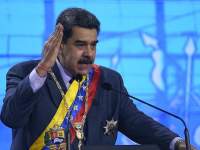Venezuela - Socialist Dystopia
Tuesday, August 27, 2024
Written by Laurence F Sanford, Senior Analyst ASCF
Categories: ASCF Articles

Venezuela is a socialist dystopia following the tragic examples of the Soviet Union, Cuba, and North Korea, where people live(d) wretched, dehumanized, fearful lives under the control of a socialist totalitarian government. Dystopia is the opposite of utopia.
Venezuela has been under socialist, communist control since 1999 when Hugo Chavez first assumed the presidency. Chavez was initially popular with his utopian plans to end corruption, increase social program spending, and redistribute wealth. But like all socialist utopian dreams, reality becomes a dystopian nightmare. Margaret Thatcher, Prime Minister of the U.K., famously stated, “The trouble with socialism is that eventually you run out of other people’s money.”
Chavez died from cancer in 2013 after medical treatments in Cuba and was succeeded by Cuban-trained labor community organizer and bus driver Nicolas Maduro. Leader of the United Socialist Party of Venezuela, Maduro has continued Chavez's Marxist policies of nationalizing the oil industry, subsidizing housing, and instituting food price controls. Oil production went from 3 million barrels a day in 2002 to under 400,000 barrels in 2020, due to government mismanagement and the firing of 20,000 petroleum engineers.
In the early 2000’s, Chavez secured a $50 billion line of credit from China based on oil sales to them. At the time, oil prices were high, and China was Venezuela’s most significant oil customer. In 2020, Venezuela had to negotiate a grace period agreement with Chinese banks on some $19 billion in loans due to the failing economy and depressed world oil prices. $10 billion is currently owed. China is the world’s largest sovereign lender and has saddled many countries, including Venezuela, with levels of debt, often through nontransparent arrangements, that lead to economic collapse, repression, and humanitarian disaster.
In addition to its deep ties with Cuba and China, Venezuela has deepened relations with other totalitarian regimes, including Iran, Russia, and the Islamist terror group Hezbollah.
● Iran and Venezuela deepened strategic ties in 2023 with 25 memorandums of understanding (MOUs) covering energy, trade, industrial development, culture, and scientific research.
● Russia supplies military equipment, including fighter jets, and conducts joint military exercises. Russian technology is helping Venezuela develop gold mines.
● Hezbollah is an Iranian proxy devoted to the destruction of Israel and the United States. Venezuela is its main base of operations in Latin America for raising money from smuggling drugs and money laundering.
Rampant violence, inflation, gang warfare, soaring crime rates, and shortages of food, medicine, and essential services due to socialist rule, have driven more than 7.7 million Venezuelan citizens to flee the country since 2015. Most refugees are dispersed throughout Latin America, although 838,000 have been encountered by the U.S. Customs and Border Control.
Maduro claimed victory on July 28 in the recent presidential election, though most outside and opposition parties have convincing proof that he lost in a landslide. Exit polling had Edmundo Gonzalez, the opposition candidate, securing 65% of the vote. The National Electoral Council and the Supreme Court, both under Maduro's control, awarded the election to Maduro. Approximately 10 million Venezuelans are considering emigrating after the recent election fraud. This represents one-third of Venezuela’s 28 million population.
It is unlikely Maduro will leave office of his own volition. He is protected by the Venezuelan army and security services, which are embedded with Cuban intelligence officers utilizing Chinese surveillance technologies.
Sanctions are not the answer to ousting Maduro. Sanctions against Cuba have been in place for over 60 years, and totalitarian communism still rules. American leadership needs to lead and work with Latin American leaders and insist that Maduro relinquish power as demanded by the election.
Summary
Why do Hollywood luminaries such as Danny Glover, Sean Penn, Naomi Campbell, and Michael Moore support Chavez/Maduro? In Glover’s case, it might be because he received $20 million from Chavez to make a movie.
Marxist communism has yet to work for the people’s benefit. Over 100 million people are estimated to have died from various communist programs. The ruling classes live well, while the rest of the people live dystopian lives, as Milovan Djilas wrote in “New Class: An Analysis of the Communist System.”
If Venezuelan and Cuban socialism is so good, why do millions flee their homeland and thousands die in the process? The litmus test of a society’s worth is how many people want to join it, versus how many want to leave it. How many people are fleeing to Venezuela? To Cuba?
The eight million Venezuelan emigrants are affecting the social fabric of neighboring countries, including the United States. Transnational criminal gangs associated with Maduro are now operating in the major U.S. cities of New York, Miami, Chicago, and Atlanta.
When it was capitalist in 1950, Venezuela was one of the wealthiest nations in the world; now it is one of the world’s poorest nations. Yet, it has the world’s largest oil reserves. Socialism, where the government controls all levers of power, has never generated a prosperous society.
Action
The United States should:
1. Vigorously advocate in the 45-nation Organization of American States (OAS) for the promotion of representative democracy in the communist countries of Cuba, Venezuela, and Nicaragua.
2. Base “reciprocity” as the foundation of U.S. diplomacy. No financial aid or favorable trade agreements should be granted to anti-U.S. countries.
3. Increase “Gray Zone” actions against Venezuela for fomenting social unrest throughout the Western Hemisphere through its alliances with Cuba, China, Russia, and Islamist terror groups.
4. Work economically and militarily with OAS members who are adversely affected by Venezuelan emigration and malevolent actions.











